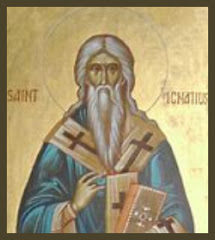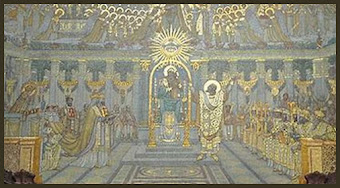The Mother of God
But when the time had fully come, God sent forth his Son,
born of a woman, born under the law,
Galatians 4, 4
Since apostolic time, Catholics have believed, and the Church has taught, that the Blessed Virgin Mary is truly the Mother of God or, in ancient Greek, Theotokos, which means “God-bearer.” This honorable designation means Mary is the mother of the
eternal Son of God, made man by having conceived and given birth to the Divine
Logos in his sacred humanity (Jn 1:1,14). Surely, Mary did not create the
divine person of Jesus who existed with the Father for all eternity, but she
did provide all the genetic material that was needed to allow God to become a
man by the power of the Holy Spirit. He is the “seed” or offspring of the woman
who God put at enmity with the serpent (Gen 3:15).
Isaiah’s prophecy was
fulfilled at the Annunciation once Mary gave her joyful consent in response to
the good news that was brought to her by the angel Gabriel: “Behold, the virgin
shall conceive, and bear a son whose name shall be Emmanuel” (7:14). The Hebrew
name means “God with us” (cf. Mt 1:23). Mary’s cousin Elizabeth deferentially
acknowledged the singular blessing conferred on her kinswoman when she asked
her, “Whence is this to me, that the mother of my Lord (Κυρίου or Kyrios) should come to
me?” (Lk 1:43).
The divine title Adonai ( אֲדֹנָי, lit. “My Lords”) is the plural form of the Hebrew
word adon (“Lord”) along with the first-person singular pronoun
enclitic. As with Elohim, Adonai’s grammatical form is usually explained as a
plural of majesty. In the Hebrew Bible, it is nearly always used to refer to
God about 450 times. The divine name YHWH was increasingly regarded as too
sacred to be uttered; it was thus replaced vocally in the synagogue ritual by
the Hebrew word Adonai (“My Lord”), which was translated as Kyrios
(“Lord”) in the Septuagint, the Greek version of the Hebrew Scriptures. Hence, the Blessed Virgin Mary is the mother of our Lord Jesus Christ, who is God Himself in His divine person and, as such, the Hebrew God of Abraham, Isaac, and Jacob incarnate.
Early Sacred Tradition
“There is one Physician who is possessed both of flesh and spirit; both made
and not made; God existing in flesh; true life in death; both of Mary and of
God; first possible and then impossible, even Jesus Christ our Lord.”
St. Ignatius of Antioch, To the Ephesians, 7
(c. A.D. 110)
“After this, we receive the doctrine of the resurrection from the dead, of
which Jesus Christ our Lord became the first fruits; Who bore a Body, in
truth, not in semblance, derived from Mary the mother of God in the fullness
of time sojourning among the race, for the remission of sins: who was
crucified and died, yet for all this suffered no diminution of His Godhead.”
St. Alexander of Alexandria, Epistle to Alexander, 12
(A.D. 324)
“Many, my beloved, are the true testimonies concerning Christ. The Father
bears witness from heaven of His Son: the Holy Ghost bears witness,
descending bodily in likeness of a dove: the Archangel Gabriel bears witness,
bringing good tidings to Mary: the Virgin Mother of God bears witness: the
blessed place of the manger bears witness.”
St. Cyril of Jerusalem, Catechetical Lectures, X:19
(c. A.D. 350)
“Just as, in the age of Mary the mother of God, he who had reigned from
Adam to her time found, when he came to her and dashed his forces against
the fruit of her virginity as against a rock, that he was shattered to pieces
upon her, so in every soul which passes through this life in the flesh under the
protection of virginity, the strength of death is in a manner broken and
annulled, for he does not find the places upon which he may fix his sting.”
St. Gregory of Nyssa, On Virginity, 14
(A.D. 370)
“Let, then, the life of Mary be as it were virginity itself, set forth in a
likeness, from which, as from a mirror, the appearance of chastity and the
form of virtue is reflected. From this you may take your pattern of life,
showing, as an example, the clear rules of virtue: what you have to correct, to
effect, and to hold fast. The first thing which kindles ardour in learning is
the greatness of the teacher. What is greater than the Mother of God?”
St. Ambrose, Virginity, II:6
(c. A.D. 378)
“If anyone does not believe that Holy Mary is the Mother of God,
he is severed from the Godhead.”
St. Gregory of Nazianzus, To Cledonius, 101
(A.D. 382)
“And so you say, O heretic, whoever you may be, who deny that God was born of the Virgin, that
Mary the Mother of our Lord Jesus Christ ought not to be called Theotokos, i.e., Mother of
God, but Christotocos, i.e., only the Mother of Christ, not of God. For no one, you say, brings
forth what is anterior in time. And of this utterly foolish argument whereby you think that the birth
of God can be understood by carnal minds, and fancy that the mystery of His Majesty can be
accounted for by human reasoning, we will, if God permits, say something later on. In the meanwhile,
we will now prove by Divine testimonies that Christ is God, and that Mary is the Mother of God.”
St. John Cassian, The Incarnation of Christ, II:2
(A.D. 430)
“But since the Holy Virgin brought forth after the flesh God personally
united to the flesh, for this reason we say of her that she is Theotokos, not as
though the nature of the Word had its beginning of being from the flesh, for
he was in the beginning, and the Word was God, and the Word was with
God…but, as we said before, because having personally united man’s nature
to himself…”
St. Cyril of Alexandria, To Nestorius, Epistle 17:11
(A.D. 430)
“If anyone will not confess that the Emmanuel is very God, and that therefore the Holy Virgin
is the Mother of God (Theotokos), inasmuch as in the flesh she bore the Word of God made flesh
[as it is written, ‘The Word was made flesh’]: let him be anathema.”
Council of Ephesus, Anathemas Against Nestorius, I
(A.D. 430)
Ave Maria
Pax vobiscum










.png)
